Урок у 7 класі на тему" Домашні обов язки"
Тема: Житло. Домашні обов’язки.
Мета: активізувати вживання лексичних одиниць теми в усному мовленні семикласників, практикувати учнів у зв’язних монологічних та діалогічних висловлюваннях, навчати дітей працювати в парах та групах;
формувати навички аудіювання та читання, вміння вживати ЛО теми в граматичних структурах, розвивати пам’ять та логічне мислення, навички аналізу та синтезу;
виховувати пізнавальний інтерес, здатність виконувати хатні обов’язки.
Тип уроку: комбінований
Обладнання: прислів’я, комп’ютерні презентації («Домашні обов’язки»), роздавальний матеріал (картки), діалог, музичний супровід, комп’ютер, мультимедійний проектор.
Хід уроку:
І. Організаційний момент
І.1 Greeting . Привітання.
- Good morning, children. I’m glad to see you. Sit down, please.
- Are you ready for the lesson? Let’s start our work.
I.2 Aims and objectivities . Привітання та емоційне налагодження на роботу/ greetings and emotional.
Today we’ll continue speaking about your home duties. Every day we try to keep our flats or houses in order. You clean the flats or help your parents about the house. So, today, as you understand, we are going to speak about your daily duties. We’re going to do some grammar exercises, listen to the text about different household machines and of cause to have a little rest after hard work. Dear children! Let’s start our lesson.
You are really good children today! I see our pupils on duty have done their best, preparing the classroom for the lesson. It is a so cozy!
Oh, all books are in order. All our plants are watered and they are so clean and fresh!
Thank you! You are good pupils on duty, reliable helpers and true masters at home, aren’t
you? By the way, on today’s lesson we will be able to clear up, who of us is a good helper and master at home, who is so-so and who ignores all his household chores at all. Do you
want to do it?
T. First of all I want you to guess and tell me what must we learn before speaking about
household chores?
P. We have to learn new words and expressions on the theme.
T. And who can name the theme of our today’s lesson? What words and expressions do
we need to make clear who is the best helper at home? Who can do household chores best
of all?
P. The theme of our today’s lesson is “HOUSEHOLD CHORES” and we have to learn
words and expressions on this theme.
T. Right you are. And that’s why I want you to be attentive and capable of working, then
all of you will show the best results. Let’s begin with...
I.3. Warming up . Уведення в іншомовну атмосферу.
Дайте відповідь на запитання : «Який у вас сьогодні настрій?».за допомогою смайликів покажіть будь ласка. Answer the question: "What is your mood today?", with smiles please show.


Why are you so sad ?
Why are you so happy?
II.Основна частина уроку.
1.Систематизація та відпрацювання лексичного матеріалу.
T. First of all I want you to guess and tell me what must we learn before speaking about
household chores?
P. We have to repeat new words and expressions on the theme.
Візьміть ваші гаджети, будь ласка,і скануйте кьюар код .Які ж ми маємо повторити слова і вирази? Читаємо і перекладаємо. Хто хоче?
T.Take your gadgets and scan the code.
What are the words and expressions we need to repeat? We read and translate. Who wants?

iron (v) –
sweep the floor (v) –
vacuum the carpets (v) –
mop the floor (v) –
lay the table/set the table (v) –
clear the table (v) –
wash the dishes/do the dishes (v) –
dry/wipe the dishes (v) –
clean the sink (v) –
take out the garbage/rubbish (v) –
fill the dishwasher/ empty the dishwasher (v) –
pick up the toys (v) –
tidy the room (v) –
make one’s bed (v) –
dust the furniture (v) –
do the laundry (v) –
cut the grass (v) –
water the flowers (v) –
weed the garden (v) –
fix the roof (v) –
buy food/clothes (v) –
overcome laziness –
2.Розвиток діалогічного мовлення.
Зараз за допомогою фраз складіть міні діалоги, запитуючи чи подобається твоєму однокласнику це заняття чи ні, а учень який відповідає повинен відповісти і прикріпити на дошку відповідний смайлик.
Now, use the phrases to create mini dialogues, asking whether your classmate likes this activity or not, and the student in charge should answeцr and attach a smiley face to the board.
Write down what do you like and hate to do about the house?
|
|
|
Тепер давайте підведемо підсумки. Які ж ви працьовиті діти! Яких більше смайликів хороших чи поганих?
Now let's summarize. What hard working kids you are! What are more smiles good or bad?
3.Мatch the pictures and words expressions, but don’t forget there is one odd expression
1.do the washing up -
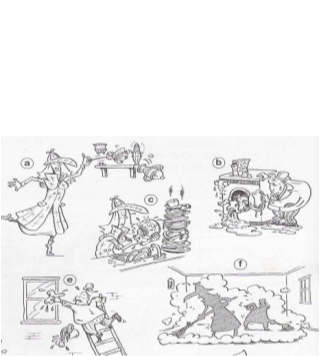 2. vacuum the carpet –
2. vacuum the carpet –
3. wash the windows –
4. dust the furniture -
5. do the laundry –
6. sweep the floor –
7. take out the rubbish-
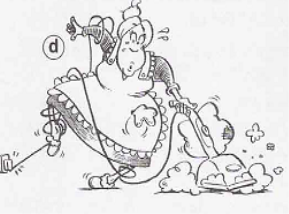
Let`s check :
1.do the washing up –
C
2. vacuum the carpet –
D
3. wash the windows –
E
4. dust the furniture –
A
5. do the laundry –
B
6. sweep the floor –
F
7. take out the rubbish
- THE ODD WORD
3.Відпрацювання лексичного мовлення за допомогою сторінки в Instagram.
1.Дітки, ми маємо нашу сторінку в Інстаграм, ця сторінка заповнена великою кількістю інформації про Англію, давайте відкриємо її. На цій сторінці учні вашого класу скидують картинки,відео та завдання з англійської мови, потім коментуєте і відповідаєте на них. А зараз давайте дамо відповіді на запитання по нашій темі, які я скинула кілька днів тому.
Kids, we have our Instagram page, this page is filled with lots of information about England, let's open it. On this page, students in your class upload pictures, videos, and assignments in English, then comment and respond. Now, let's answer the questions on our topic that I dropped a few days ago.


2. « Хмара слів».
Як я зрозуміла ви дуже хороші помічники!
А давайте ще за допомогою «хмари слів» розшифруємо : «Які ж ще слова відносяться до нашої теми?». Назвіть їх, будь ласка. На уроках англійської мови ми часто використовуємо таке завдання.
As I understand you are very good helpers! Let us also decipher with the help of the word cloud: "What other words are relevant to our topic?" Please name them. In English lessons, we often use this task.
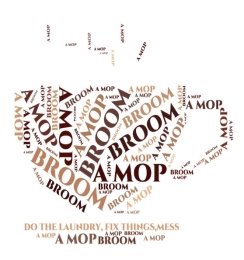
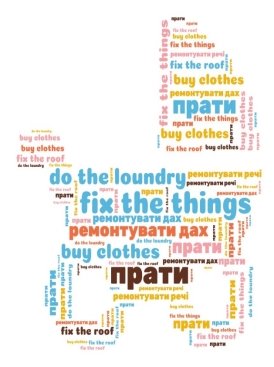



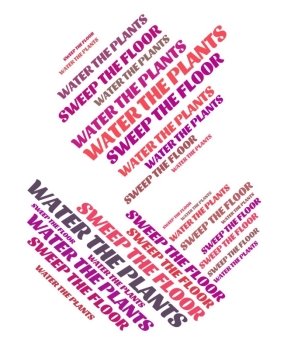

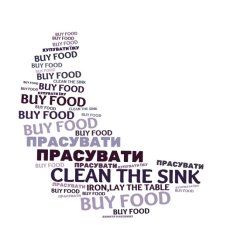
3.Розвиток умінь аудіювання та говоріння.
А зараз дивимось відео про обов’ язки однієї з сімей,тоді відповідаємо на запитання.(Відео)
У кого з членів родини які обов’язки?
Про приклад сім’ї ми подивилися, тепер розкажіть про обов’язки вашої сім’ї .
And now we watch a video about the responsibilities of one of the families, then we answer the question. (Video)
Which family members have responsibilities?
We looked at an example of a family, now tell us about the responsibilities of your family.
Я так зрозуміла, найбільше роботи у ваших мам. Так? Не дарма кажуть, що жіноча робота ніколи не закінчується. А до нас завітала справжня мама, яка хоче поділитися з вами про її домашню роботу. Слухаємо і відповідаємо на запитання. Будьте уважними. (Бобрик Аліна про себе).
I understand that most of all work for your moms. So? Not for nothing say that women's work never ends. And a real mom came to us who wants to share with you about her homework. Let's listen and answer the question. Be careful. (Bobrick Alina about herself).
Do you always do everything you can to help your mother?
The mother in every family has a lot of work to do in the house. All day long I am
busy, doing one thing or another. I work at an office and can’t do the
rooms, cook meals, wash up and manage to do a lot of other things, which need much time and force. That’s why we try our best to help her. There is some dust on the floor and on the furniture every day. So I sweep the floor with a broom or clean it with a vacuum-cleaner. Then I dust the furniture with a duster. Sometimes I have to polish it. I make our beds too and try to keep our rooms clean and tidy. And of course I try to keep our things in the right places. I can concentrate on the more specialized jobs of cooking, ironing or mending. Doing household chores is necessary part of our life because we all like comfort, clean and tidy clothes. That’s why we do rather difficult and even boring housework in spite of our wish and desire. Day after day I clean the shoes for all the family, water the plants, feed and air the dog and go shopping . All you know that “Woman’s work is never done” .
There is always something to do for our Mums in all families. LET`S HELP THEM!
Post-reading activity:
1.Answer the questions:
Mother is busy all day long, isn’t she?
1. Практикування учнів у груповій роботі.
Вчитель ділить учнів за допомогою нитки. Я маю 12 ниточок учнів
. Я буду тримать у руці жмутик з нитками за середину, кожен учень
повинен взятися за кінець однієї нитки. Коли відпущу жмут і учні по два
тримаються за одну довгу нитку – утворилися пари. Школярі отримують
роздруківки із завданням.
The teacher divides the students with a thread. I have 12 threads of students. I'll have a trimatte in my hand with a floss for the middle, each student
should take the end of one thread. When I release a bundle and the students two
hold on to one long thread - pairs are formed. Students get it
prints with the task.
1. to boil a) to make sth dry when its wet
2. to cut b) to cook sth in hot fat or oil
3. to dry c) to give sb food or drink
4. to fry d) a task that you do regularly
5. to pour e) to do regularly task about the house
6. to prefer f) to divide sth into 2 or more pieces with knife
7. to serve g) to make a liquid flow from kettle into the cup
8. to do chores h) to heat the water
9.to do householding i) to like one thing or person better than another
KEY: 1 – h, 2 – f, 3 –a, 4- b, 5 –g; 6 – I; 7 – c; 8 – d; 9 – e
2.Розвиток умінь мовлення. Робота з картками.
I have in advance prepares a magic box. Aesthetically decorated box
which has a task for the students. Students take turns reading, from the teacher's magic box
answer him: is it not true?
Say if it is true or false.
1 Everyone must know that he has to do his or her part of chores. +
2 Doing shopping is not a household duty. -
3 The elder sister is usually the greatest helping hand for mother. +
4 We usually boil sausages in a frying pan. -
5 We usually fry in kettles. -
6 To make tea we need a kettle and a tea pot. +
7 My father is good at making coffee. +
8 His elder sister never drinks coffee. +
9 After breakfast father washes up with a dishwasher. -
10 Mother cleans the table after breakfast. +
11 The elder sister does lots of things about the house. –
3.Метод незакінченого речення.
Учні отримують завдання на аркушах і виконують завдання в зошитах.
The unfinished sentence method. Students get assignments on sheets and
perform tasks in exercise books. Complete the sentences according to the text above.
1 Doing a work about the house is called ... ( doing chores )
2 Usually each member of a family has a ... ( householding duty )
3 Writing notes to each other helps family members to ...( remember things to
do )
4 Usually mother is the busiest person in ...( the householding chores )
5 We can …. or …. eggs for breakfast. ( boil sausages or fry )
6 When dish is ready we can … ( eat )
7 To make tea we should … ( boil the water in the kettle, put some tea in the tea
pot, pours some of the boiling water into the pot )
8 We can wash up and dry the dishes with … ( the dishwasher machine)
9 We should put clean dishes …( onto the cupboards )
10 A woman’s work is ...( never done )
III. Заключна частина уроку
1.Підведення підсумків уроку
А зараз знову повернемося до кьюар коду,і дізнаємось чи хороші ви дочка і син. Скануйте,поставте плюс чи мінус в зошиті і порахуйте кількість плюсів.
Now let's go back to the quar code again and see if you are a good daughter and son. Scan, put a plus or minus in the notebook and calculate the number of pluses.
«Are you good son or daughter?»
- 1) Can you say when your mother's (father's) birthday is?
- 2) Are you always polite and kind with your parents?
- 3) Do you set the table?
- 4) Do you clean your room?
- 5) Do you go shopping?
- 6) Do you wash the dishes?
- 7) Do you feed your pet?
- 8) Do you make your bed?
- 9) Do you take care of your little brother (sister)?
- 10) Do you sometimes give presents to your mother?
8 - 10 "yes" - you are an ideal child;
6 - 8 "yes" - you are a good child;
4 - 5 "yes" you must try to be better;
less than 4 "yes" - I'm sorry for your parents."
- Who is an ideal child? Who is a good child? I'm happy for your parents.

T. As you see, children, there are many household chores, which people have to do in
spite of their wish and desire. All parents try to manage them because you can hardly find a person, who does not like comfort, delicious food, clean and tidy clothes. But these household chores or as we called them housework need much attention and doing them by all means. That’s why you have to help your parents obligatory, if you want to live in a happy, friendly and united family.
As for me I don’t think that there is somebody in our class who doesn’t care of
himself and of his parents. I hope that you are all good helpers in your families. Thank you for good work at the lesson.
Lets sing our song…
And now I want you to think carefully and tell me,
which household chores we do usually (every day), which we do weekly or only monthly.
Divide these chores into three columns:
Every day weekly monthly
3. T. And now we will have a card dictation. I’ll show you a picture, depicting one of the
household chores and your task is to write/ to name which word or a phrase is depicted
there.
4. T. Well done, thank you! Your works will be estimated later. And now I want you to
answer the questions, using the following phrases, when possible: (As to/ as for; on the
whole; as a rule; actually; in fact; frankly/strictly speaking; I believe/suppose in; that
depends on.)
1. Do you help your parents about the house?
2. How often do you help them?
3. What kind of household do you usually have?
4. What is your favorite house work?
5. What kind of household chores do you particularly dislike?
6. How often do you clean/dust the room?
7. Do you wash up/do dishes every day?
8. Can you cook meal?
9. Who usually lays the table in your family?
10.When do you make your bed?
5. T. Listening
Pre-listening activity: What is housekeeping?
Housekeeping.
Housekeeping is the everyday practice of domestic science in the flat or in the
house. It is the management of a home. There are some certain things in the family
which people have to do, whether they like them or not. One of these things is
household chores. It is what someone in the family has to do every day in spite of his or
her wish and desire. Can you find a person among your relatives and friends, who
doesn`t like comfort, delicious food, clean and tidy clothes? You can hardly find
someone because all of us like to have our dwellings clean, tidy and cozy. People all
over the world try to keep their homes clean and cozy and this work takes them a lot of
time and force. Doing household chores is a necessary part in our life. It is not an easy
work and sometimes it is rather boring and takes much time with a hardly visible result.
That`s why it isn`t a bad idea to have a kind of subdivision of housework at home,
when each member of the family has his own daily household job. If every person does
his bit about the house then keeping it isn`t difficult and boring and proves the proverb:
“Many hands make light any work”.
For example, children should keep their rooms tidy, make their beds, lay the
table for meals, clear away the dishes and wash up. The mother could then concentrate
on more specialized jobs of cooking, ironing or mending. Shopping at the market could
be a kind of outing. The father should do more difficult physical work. This is an ideal
variant to keep the house. It`s a pity, that in many families the problem of clearing up
the flat or a house becomes a generation gap. Children in such families do not want to
clean up their rooms and their parents make them do it. In most of the cases children
consider that their parents have very old-fashioned ideas about making beds in the
morning, washing the dishes after meal etc. They think that new generation shouldn`t
care about things like that. Many conflicts develop on this ground. Sometimes children
promise to help but fail to do their work and parents make them do it or speak in angry
voice to make the bed or to pick up toys from the floor.
To avoid conflicts many mothers try to do all work themselves and of course they soon
become tired, nervous and unhappy. I think all children are always able to manage their
part of household chores, even if they are busy if they want to live in a happy, friendly
and united family.
2. Post-listening activity.
3. Work in groups. Topics to talk about:
1. Household chores are necessary for every family.
2. Advantages and disadvantages of having a domestic servant?
3. It’s high time to play a little:
The group is divided into two teams. Teacher sets the timer for three minutes and
shows a card with a written word or an expression to one of the members of the group,
who has to explain this word or the expression in his team. As soon as he has done it
another pupil gets his card and starts doing the same.
The team, which guesses more cards, wins.
3. Prove: Mother’s work is never done.
A minute for a joke: Read the poem and try not to be like that boy:
I got up in the morning
I got up in the morning
And tried to find my shoes
My trousers, my coat,
My lovely brown boots!
I couldn’t find a single thing,
But heard a bird, who said:
“Put all your things in their place
Before you go to bed!
Do you like the poem? And do you like the boy? Do you want to be in his place?
Is his Mum proud of him?

про публікацію авторської розробки
Додати розробку
